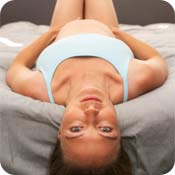
You stayed up late last night to finish a project, woke up groggy only to realize that you’d slept through the alarm clock, skipped breakfast, then almost fell asleep in the middle of an important morning meeting. It’s now mid-afternoon and, as you’re having yet another cup of coffee to stifle yet another yawn, you realize you’re seemingly sleep walking through your days.
You’re not the only one. Nightly sleep for the average American has dropped from 10 hours (before the invention of the lightbulb) to 6.9 hours, with a third of adults now getting even less than that! In fact, nearly half of all adults admit they sleep less so they can work (or play) more, according to the National Sleep Foundation (NSF). Although most experts agree that the average adult needs eight hours, most of us have burned our candle at both ends.
But how do you get off this "sleep deficit" merry-go-round? It's easy to say, "get more sleep" but what if you're simply spending frustrating hours tossing and turning, and having trouble finding deep slumber?
First, it’s important to be aware that sleep is not a passive activity. Healthy sleep is every bit as valuable to your overall well-being as exercise and good nutrition. Research shows that a lack of deep sleep (as opposed to irregular or fragmented sleep) undermines the body's ability to fight off disease. Perpetual sleepiness can reduce the quality and quantity of your work by a third, according to the NSF. In fact, if you’re sleep-deprived you’re likely to have higher concentrations of sugar in your blood, which could contribute to development of a pre-diabetic condition.
If you’re having major problems in your sleep life, you probably should consult a doctor. But for most of us who are having trouble sleeping, there’s a simple cure: exercise. Working out regularly has been shown to reduce episodes of insomnia. What’s more, it promotes improved sleep quality by producing smoother, more regular transitions between the cycles and phases of sleep.
Moderate exercise lasting 20 to 30 minutes three or four times a week generally results in better sleep and more energy. You may have to find your own exercise rhythm-– some people can exercise any time, while others do better if they work out in the morning or afternoon, not near bedtime. But, vigorous exercise during the day and mild exercise before bedtime will not only help you fall asleep and stay asleep more easily, but will increase the amount of time you spend in deepest sleep phase (Stage 4 REM Sleep).
Continued ›
| 





Member Comments
TY for this article ! Report